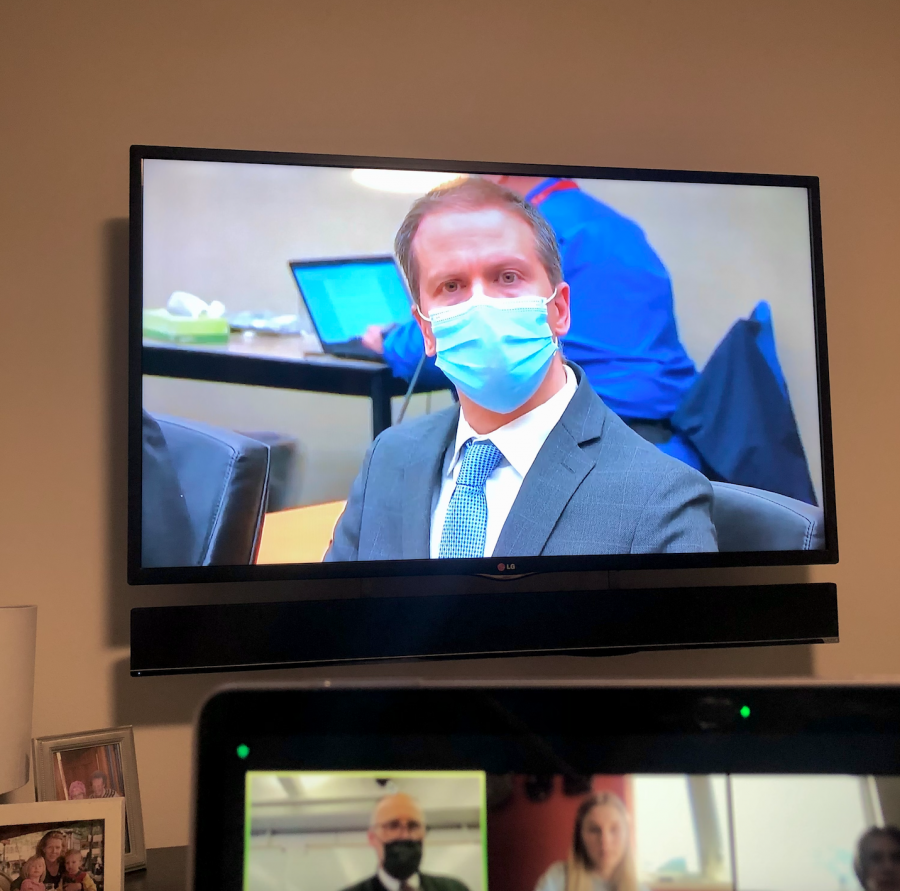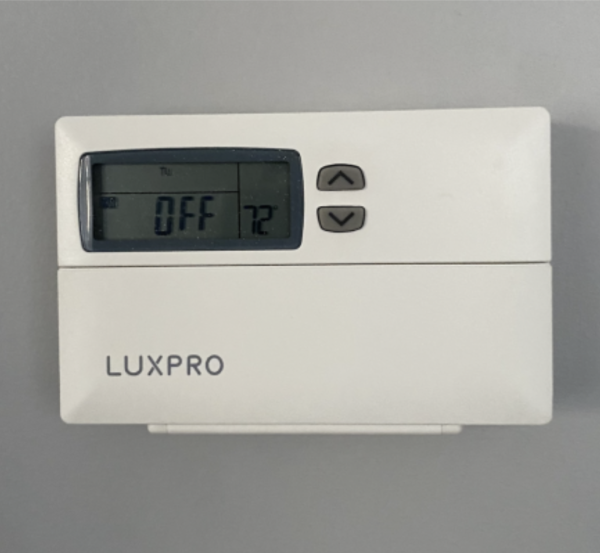SHC Reacts: Trial of Derek Chauvin
Margot Hart watches the reading of the verdict as she joins Mr. Standley’s 8th Block AP Computer Science class.
Almost a year ago, protests erupted nationwide over the killing of George Floyd by police officer Derek Chauvin. The viral footage, shot by a 17 year old bystander, showed the Minneapolis police officer kneeling on Floyd’s neck for nine minutes and 29 seconds as Floyd told the officers, “I can’t breathe,” over and over. 11 months later, the much-anticipated trial of Chauvin found the officer guilty of second-degree unintentional murder, third-degree murder, and second-degree manslaughter and he now faces up to 40 years in prison. As usual, SHC has something to say about the verdict and what this says about the state of racial justice in the United States.
What did you feel when you first heard the verdict?
“I felt relieved because George Floyd, his family, and the many others that have lost a loved one to police brutality have got some form of justice.” -Alexis Harper, ‘22
“I am glad that this (valid) verdict was reached, but I am surely not rejoicing in the American judicial system, which constantly disappoints justice.” -Liya Fasil, ‘24
“I felt relieved that our system, although it took way too long, made a verdict that went with the people and not the government for once.” -Mieko Dimitroff, ‘22
“I feel happy for the family, but upset with the continued violence in major news outlets against African American people by the police.” -Samir Hooker, ‘21
“I felt a big sense of relief, but I still felt a weight on my chest just like everyone else. While this verdict may be taking a step forward in the right direction, this is still not justice.” -Capen Ades, ‘22
“I was relieved because I honestly thought there was a chance the justice system would fail again and not hold him accountable.” -Claire Alonso, ‘22
Do you think this verdict shows social change and progress? Why or why not?
“In this novel age of technology, what has been hidden is being revealed. This is causing people, particularly those whose jobs are to serve the people, to be held accountable. Before contagious diffusion from recordings posted on Social Media and mass sharing, this sort of thing was happening all the time, but there was no stopping. Now, I do believe that, at a slow pace, social change is developing. Finally, finally! A new era has begun.” -Liya Fasil, ‘24
“Somewhat: there is still much work to be done such as reforming police and having dedicated people to deal with mental health and deescalate situations.” -Jack Bryne, ‘21
“I think this verdict is certainly a step in the right direction in holding law enforcement officers accountable.” -Anonymous, ‘23
“I think the verdict showed justice but only because of the vast news coverage and the emotional controversy it sparked. Had George Floyd’s death been swept under the rug, I think the officer’s verdict would be very different from that of what was proclaimed on the news.” -Samir Hooker, ‘21
“I do think this verdict shows social change and progress because not many police officers who have killed people like this have actually been prosecuted. I do think this is progress but, of course, it isn’t anyway near the amount of progress we need to fix things.” -Devin Blair, ‘22
Did you talk about it in your classes?
“Yes, in History of Christian Art (HOCA), we watched a short documentary about how the family members of police brutality victims reacted. We also discussed afterwards.” -Liya Fasil, ‘24
“I have not talked about it in class (sadly).” -Mieko Dimitroff, ‘22
“My Ethics, ERWC (Expository Reading and Writing), and U.S. History teachers opened some of class time for anyone to speak on the verdict. Although the conversation was opened, no one in my class felt the need to discuss it and stayed silent.” -Alexis Harper, ‘22
“In church history class, we are just about to wrap up a short, but in-depth unit on racism and racial justice in relation to the Catholic church. We studied Bryan Massingale’s Preface to Racial Justice in the Catholic Church and Sister Thea Bowman’s Address to the USCCB in 1989. Our focus was on answering these key questions: “What detracts from unity in the Church–and harms the People of God? How can the Church better actualize unity? To what extent is racism part of the heritage of the Catholic Church and how? What witness and gifts do Black American Catholics bring to the Church? How can we bring their and other marginalized voices to the center of the study of Church History?” Although we did not talk about the Chauvin Trial verdict, I appreciate that we were able to have a conversation on racism and a safe space where we could share our questions, concerns, and hopes regarding racial justice.” -Anonymous, ‘23
“I talked about it in my Ethics class during our prayer.” -Capen Ades, ‘22
Other thoughts about the verdict:
“I’m glad that justice was served with a guilty verdict, but real justice would mean that George Floyd and all other victims of police brutality would be alive with us today.” -Anonymous, ‘23
“I think it is important that, even though this is a win for racial justice, we need major police reform to even think of ways to really fix the issue at hand.” -Devin Blair, ‘22
“Our world is slowly progressing. People are being heard and are not settling for anything less than justice. This verdict marks the beginning of social change. Hopefully, there will not be another tragic incident such as the death of George Floyd but now officials in law know that the people will not be silent and will speak up for what is right. Our voices will be heard and justice will be served.” -Alexis Harper, ‘22
“If justice was not served that day (and Chauvin was called “innocent”), the outrage would be rapidly collected among the masses. But I feel good about the decision made, and I hope the same would have been if George Floyd’s name was unknown by the world.” -Liya Fasil, ‘23
“I believe some justice was served towards the family, but the death was still unwarranted and many people still have ill feelings towards the family impacted. Another case of a young African American girl was recently headlined and it just feels like a perpetual cycle of violence, which is sad. I do see a lot of people from all walks of life posting and spreading awareness which is good, but true justice isn’t anywhere near served in terms of the systemic inequalities Melanated people face.” -Samir Hooker, ‘21
As noted by Samir, on the same day of Chauvin’s trial, just minutes before the verdict was read to the public, Ma’khia Bryant, an African American teenage girl, was shot by police in Columbus, Ohio. Since the beginning of the trial on March 29, 64 people nationwide have died at the hands of law enforcement. More than half of these deaths have been Black or Hispanic people of color. Although Chauvin’s conviction is an important step, this is far from the end of the fight for racial justice.










